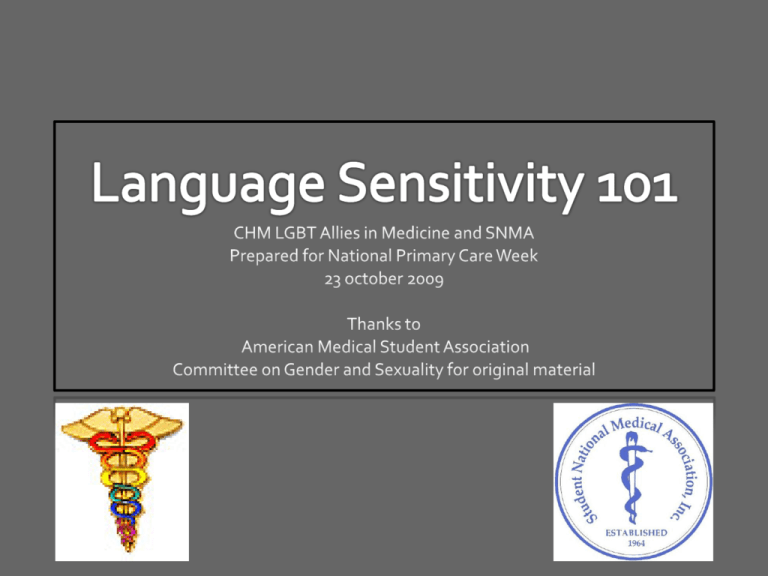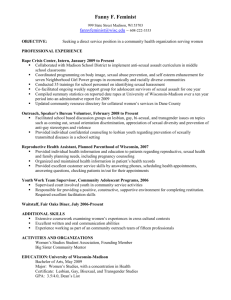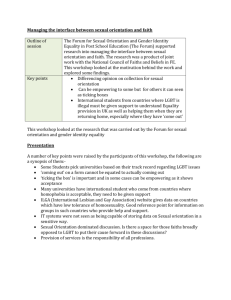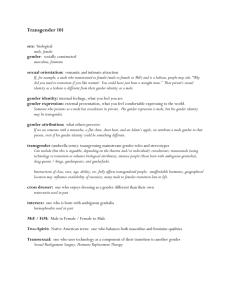Language Sensitivity 101
advertisement

Goals To become familiar with terminology relating to minority patients. To be comfortable saying out loud what these words mean, and come to some working agreement on how we use them. To encourage participants to respond when they hear these terms being used incorrectly. To encourage participants to develop tools that will help them to connect with and advocate for patients who are marginalized. Scenarios/Brainstorm You are a lesbian patient who has come in for a yearly physical. You have never met this physician before. Your partner does not have health insurance. Underlying feelings What should the doctor do to make this patient feel comfortable? How would you respond if the doctor asked Are you married? Are you sexually active? What form of birth control do you use? You’ve never had sex with men/women, right? Oh you’re a lesbian? You aren’t at risk for HIV. I HAVE to ask, do you have sex with men, women or both? Do you have sex with men, women or both? Scenarios Gay man concerned about partner’s care Lesbian who wants to have children Bisexual married woman Gender-transitioning person Questioning teen Immigrant (Legal or undocumented) Iraqi man African American woman Have we observed prejudiced behavior? Among physicians? Professors? Classmates? What’s wrong with these sentences? Although Mary was blonde, she was still intelligent. Pat is a male nurse. Terry Harris, a well-known female productivity consultant, will advise the committee. Dr. Martinez, a senior citizen, continues to maintain his practice despite his age. Paraplegic James Alton competes in marathons with other crippled racers who train in wheelchairs. With the simple nobility that characterizes his people, Onondaga Indian leader Leon Shenandoah acted as a spiritual and political advocate for the Iroquois Confederacy until his death in 1996. VOCABULARY Sex “Sex” refers to biologically determined differences in chromosomes, hormonal profiles, internal and external sex organs. An identity, derived from anatomical or biologic features. People are assigned a sex at birth based on the appearance of their genitalia. Occasionally chromosomes, genitalia, and hormones present in varied combination. Sex identity can be changed. Gender Gender describes the characteristics that a society or culture delineates as masculine or feminine. Gender identity is an identity derived from the individual’s internal sense of gender. Gender Expression Behaviors, derived from the individual’s gender identity. Involves dress, styling, mannerisms, social roles and interactions. Can only be understood in the context of given cultural expectations and normative gender roles. Gender expression may be particularly fluid over the course of a person’s lifetime. Assimilation Cultural assimilation is a political response to the demographic fact of multi-ethnicity which encourages absorption of the minority into the dominant culture. It is opposed to affirmative philosophy (multiculturalism) which recognizes difference. Often used with regard to immigrants. Acculturation The exchange of cultural features that results when groups having different cultures come into continuous first hand contact; the original cultural patterns of either or both groups may be altered, but the groups remain distinct. Exchange of foods, music, dances, clothing, tools, technologies. Related to “Westernization” and cultural appropriation. Racism Racism is the belief that race is the primary determinant of human traits and capacities and that racial differences produce an inherent superiority of a particular race. Racialism Racialism entails a belief in the existence and significance of racial categories, but not necessarily in a hierarchy between races. Ummah Ummah is an Arabic word meaning “community” or “nation.” In the context of Islam, it is used to describe the diaspora, or “community of believers.” Ethnic Group A category or group of people considered to be significantly different from others in terms of cultural (ie dialect, religion, traditions) and sometimes physical characteristics (ie skin color, body shape). Commonly recognized North American ethnic groups include American Indians, Jews, Latinos, Chinese, AfricanAmericans (“black”), European Americans (“white), etc. Multiculturalism A “salad bowl” model of society in which the permanent existence of unassimilated and partially assimilated ethnic/racial minorities is accepted and encouraged. Those who advocate this model for the US generally advocate providing special attention and assistance to minorities that have been underrepresented in the past. Melting Pot A society in which immigrants and native ethnic/racial minorities are assimilated into the dominant national culture. Those who prefer this model for the US generally advocate encouraging assimilation in order to reinforce national unity. Boundary Maintenance Generally considered a positive term, reinforcing an ethnic group’s unity and distinctness by emphasizing the traits that set its members apart from others, rather than what they share in common with them. Original rainbow flag had 8 stripes, with specific meanings ascribed to the colors: Pink: sexuality Red: life Orange: healing Yellow: sunlight Green: nature Turquise: magic/art Indigo: serenity/harmony Violet: spirit GLBT/LGBT LGBTQIA = Lesbian, Gay, Bisexual, Transgender: someone whose gender identity does not match their anatomical sex Queer (sometimes Questioning) Intersex: an individual who is born with external/internal genitalia and/or secondary sex characteristics determined as neither exclusively male nor female Ally: someone who doesn’t identify as, but supports LGBTQI social movements. Human Rights Campaign logo symbolizing equality. HRC is the largest LGBT lobby group/political action committee in the US. Straight Allies Straight ally describes a heterosexual person who supports equal civil rights, gender equality, and LGBT social movements. Straight allies can also have a “coming out” process. MSM Men who have sex with men Refers to men who engage in sexual activity with other men, regardless of how they identify themselves. Many choose not to accept social identities of gay or bisexual. Intersex An individual who is born with external/internal genitalia and/or secondary sex characteristics determined as neither exclusively male nor female. “Hermaphrodite” is an antiquated term that is stigmatizing. Current change to “Disorder of Sex Development (DSD). Two-Spirit A term used by individuals who are part of American Indian and Canadian First Nations groups. Usually implies both a masculine and feminine spirit living in the same body. Also used by some contemporary LGBT Native Americans to describe themselves. Native terms for these individuals exist in various Native American languages. MTF/FTM Male to Female/Female to Male Generally refers to transsexual individuals. Genderqueer Similar to how “Queer” might refer to any non-normative sexual orientation, “Genderqueer” relates to a non-binary sense of gender identity and refusal of labels that may or may not involve sexual orientation. Transvestite Regardless of motivation, a person who wears clothes (make-up, etc) that are considered culturally appropriate for the opposite gender, but not for one’s own. Drag queen/king: a person who dresses in clothes of the opposite gender specifically for an event or performance. Crossdressing: a term given to those who dress in clothes of the opposite gender for any reason other than performance or special occasions. Usually satisfied with one’s own gender identity, but finds satisfaction in crossdressing. Sexual Preference Similar to “sexual orientation,” indicating a pattern of emotional, romantic and sexual attraction to men, women or both genders. “Sexual preference” is more commonly used by people who believe that sexual orientation is a matter of choice. Sexual Orientation The preferred term used to describe pattern of emotional, romantic and sexual attractions to men, women, or both (or neither). Also has a social component: sexual orientation refers to a person’s sense of “personal and social identity based on those attractions, behaviors expressing them, and a membership in a community of others who share them.” Affectional Orientation Used alternatively to “sexual orientation.” It is based on the perspective that sexual attraction is one component of a larger dynamic; one’s orientation is defined by those with whom one is predisposed to fall in love. Hypodescent In societies that regard some races of people as dominant or superior and others as subordinate or inferior, hypodescent is the assignment of mixed-race children to the race that is considered subordinate or inferior. The opposite practice is hyperdescent, in which children are assigned to the race that is considered dominant or superior. The Nazis used this criterion for labeling people as Jews whose only connection with Judaism was a grandparent. Similarly, it has been used in North America to label people as African American even if they were mostly European in biological ancestry. Hypodescent is also known as the "drop of blood" criterion. Stonewall Birth of the gay rights movement in the US: the Stonewall riots were a series of spontaneous, violent demonstrations against a police raid in Greenwich Village, NYC, June 28, 1969. Commonly cited as the first instance in US history when people in the LGBT community fought back against persecution of sexual minorities. Minority Less than one-half. Majority Greater than one-half. AHANA “African-American Hispanic Asian Native American” inclusive term coined at Boston College in 1979 by two students who objected to the name “Office of Minority Programs.” They cited the definition of the word minority as “less than” and proposed, instead, to use AHANA which they felt celebrated social and cultural differences. Debrief What did you learn? How do you feel about how the words were defined? Did it change your perception after hearing the definition? Are we in agreement over these definitions or not? How can we speak up if we hear questionable language coming from a Professor Peer Attending Physician





